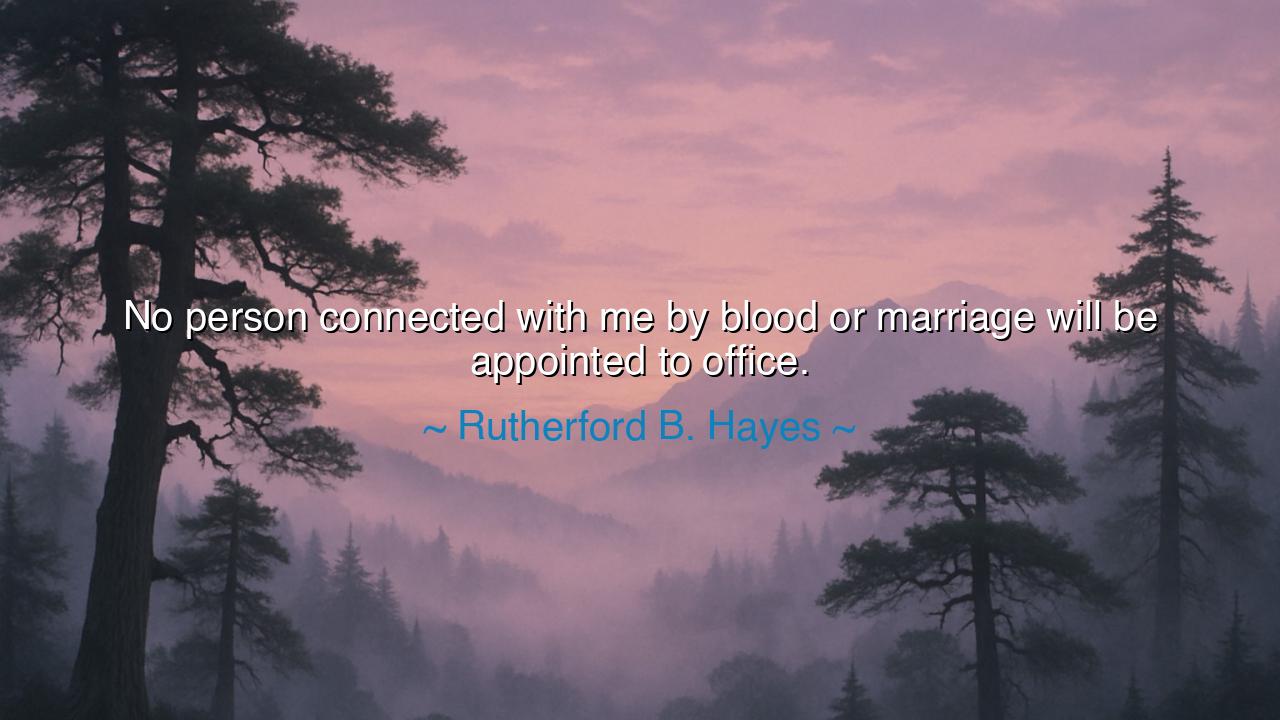
No person connected with me by blood or marriage will be






When Rutherford B. Hayes declared, “No person connected with me by blood or marriage will be appointed to office,” he spoke not as a mere politician, but as a guardian of integrity, a defender of justice against the corruption that so easily takes root where power and favor meet. His words were not born from cold austerity, but from a noble conviction—that the strength of a nation rests not upon kinship or influence, but upon merit and virtue. In a time when nepotism had spread through the veins of public office like a silent disease, Hayes sought to purify the body of government through example. His declaration was an act of moral courage, a pledge that principle must triumph over preference.
The meaning of his words reaches far beyond the walls of government. What Hayes declared is a universal truth: that the just man must never confuse love with favoritism, nor allow affection to outweigh fairness. To govern rightly, one must rule first over one’s own desires. By rejecting the appointment of those connected to him “by blood or marriage,” Hayes was not turning from family—he was turning toward honor. He understood that the temptation to favor one’s own is among the oldest and most dangerous of human failings, one that corrodes fairness, weakens institutions, and breeds resentment among the deserving. To deny this temptation is to stand upon a higher ground, where duty to the common good surpasses the comforts of personal loyalty.
To understand the origin of this declaration, we must look to the age in which Hayes lived. In the 19th century, the American government was steeped in the practice of patronage, where offices were often granted not to the capable but to the connected. The “spoils system,” as it was called, had become a poison to democracy. Hayes, upon ascending to the presidency in 1877, sought to reform this system, to cleanse the public trust from the taint of self-interest. His words were not mere rhetoric—they were the embodiment of reform. In choosing virtue over advantage, he placed himself in the tradition of ancient leaders who believed that public service is a sacred duty, not a family inheritance.
History offers countless examples of those who failed to heed this wisdom. Consider the decline of the Roman Empire, where emperors often filled their courts with relatives and favorites, granting power not by merit but by blood. Over time, this web of nepotism strangled the vitality of Rome. The empire that had once stood upon discipline and order decayed into corruption and greed. The soldiers lost faith in their leaders, the people lost trust in their rulers, and Rome fell—not by sword alone, but by the erosion of virtue. Hayes, whether consciously or not, stood against that ancient shadow. His words echoed the voice of those who understood that justice cannot survive when kinship becomes a substitute for competence.
But even beyond politics, Hayes’s statement speaks to the moral order of life itself. In every house, in every craft, in every community, the same principle applies: favoritism blinds the eye, while fairness strengthens the soul. The teacher who favors one student over another, the leader who promotes without merit, the parent who excuses wrongs out of love—all become architects of imbalance. True love and true leadership require impartiality. To act with integrity is not to love one’s family less, but to love righteousness more. Hayes’s refusal to appoint those close to him was not an act of distance, but of devotion—to the ideal of a just and impartial nation.
The lesson his words impart is eternal: that true honor requires self-denial. The noble soul does not use power to elevate the familiar, but to uplift the worthy. The wise ruler, the honest leader, the just man—all understand that power is a trust, not a possession. When we allow personal bonds to dictate our public duties, we betray both. But when we rise above the pull of favoritism, we join the ranks of those who have served humanity not for gain, but for principle. In this way, Hayes’s quote becomes more than a political statement—it becomes a moral commandment for all who wield influence, great or small.
So, my child, remember the wisdom of Rutherford B. Hayes. Let no bloodline or affection cloud your judgment in matters of fairness. Be loyal, but let your loyalty be to truth; be loving, but let your love never corrupt your justice. When you are called to lead, whether in a home, a business, or a nation, act as one who serves something higher than himself. For the measure of greatness is not whom we favor, but what we stand for. To appoint the deserving over the familiar, to choose virtue over comfort—that is the path of the righteous, the discipline of the noble, and the legacy of the just.






AAdministratorAdministrator
Welcome, honored guests. Please leave a comment, we will respond soon